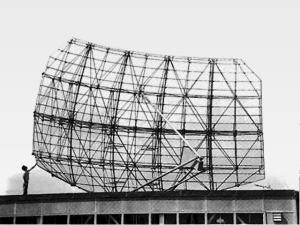AN/FPS-30
Description of the radar set, tactical-technical characteristics

Figure 1: AN/FPS-30 on the roof of building C at Lincoln Laboratory (1955)
| Specifications | |
|---|---|
| frequency: | 570 … 630 MHz
( lower L-Band) |
| pulse repetition time (PRT): | 2595 µs |
| pulse repetition frequency (PRF): | 385 Hz |
| pulsewidth (τ): | 4 … 52 µs |
| receive time: | |
| dead time: | |
| peak power: | 400 kW … 200 kW |
| average power: | 4 kW … 616 W |
| instrumented range: | 200 NM (≙ 370 km) |
| range resolution: | 620 m |
| accuracy: | ±0.5° |
| beamwidth: | 2° |
| hits per scan: | |
| antenna rotation: | |
| MTBCF: | |
| MTTR: | |
AN/FPS-30
Radar Set AN/FPS-30 “Sentinel” was an lower L-Band high-power, long-range search radar system. It was capable of detecting, locating, and identifying any conventional high performance aircraft. For continuous operation and extended reliability two complete radar transmitter and receiver systems are included in this radar set. Both Channels of the AN/FPS-30 are housed on the same floor in the building and each cabinet is shielded to prevent interference from an external source or interference within the system.
Only four pieces of this radar were produced and deployed at sites in Greenland. It was an advancement over the AN/FPS-19 radars deployed in Alaska and Canada, being optimized for use in severe Arctic conditions. It was planned as a replacement, however cost constraints led to it only being installed at the Greenland sites.
Source:
- Military Standardisation Handbook TM 11-487C-1/MIL-HDBK-162A, Volume 1, p. 126
